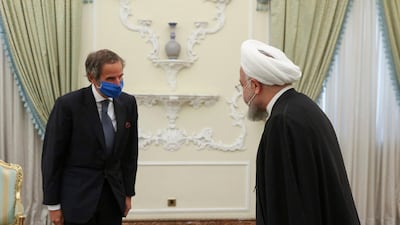The UN atomic watchdog on Wednesday said its inspectors confirmed that Iran has begun to produce uranium metal in another breach of its 2015 nuclear deal with world powers.
International Atomic Energy Agency head Rafael Grossi told member nations that inspectors confirmed on February 8 that 3.6 grams of uranium metal was produced at Iran’s Isfahan plant.
Uranium metal can also be used for nuclear bombs and research on its production is specifically prohibited under the nuclear deal Tehran signed with Germany, France, Britain, China, Russia and the US in 2015.
Iran had said its plans to conduct research and development on uranium metal production were part of its “declared aim to design an improved type of fuel", the IAEA said.
Since the US withdrew from the deal in 2018, the other members have been trying to preserve it.
Tehran uses breaches of the deal to pressure the other signatories into providing more incentives to offset sanctions reimposed by the US after it pulled out.
The ultimate goal of the deal is to prevent Iran from developing a nuclear bomb, something it insists it does not want to do.
The latest move by Tehran further complicates the efforts of the other member nations to entice the US to return to the deal, which President Joe Biden has indicated he would be open to.
When Iran announced its plans in January to produce uranium metal, the German, French and British foreign ministries issued a joint statement saying they were “deeply concerned".
“Iran has no credible civilian use for uranium metal,” they said. “The production of uranium metal has potentially grave military implications.”
Although uranium metal in theory can be used in generating electricity, experiments with it are prohibited under the nuclear deal because it is a key material in making nuclear weapons.
The process involves converting high-enriched uranium gas into metal that provides the cladding, or outer covering, for the fuel rods that power a nuclear reaction.


